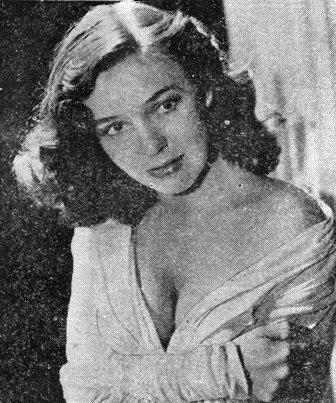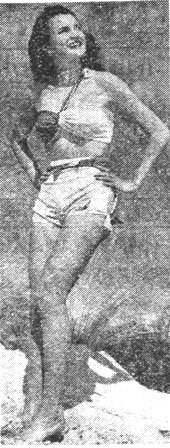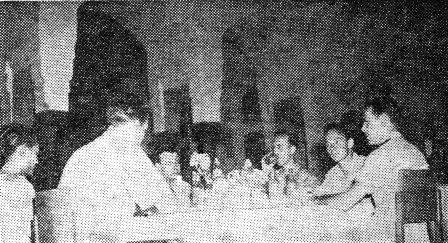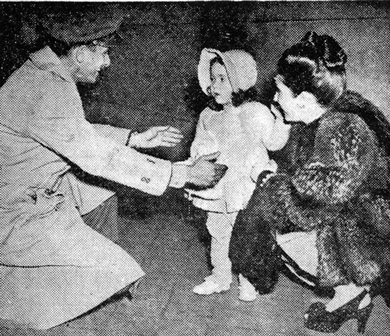SURPLUS SALE TO MEAN END OF MISSION IN I-B
Roundup Assistant Editor The end of India-Burma Theater activities appeared more clearly in sight this week, following the announcement of Secretary of War Robert P. Patterson in Washington in which he said that all U.S. forces in India and Burma, with the exception of a few Air Force personnel, will be withdrawn as soon as surplus property here is disposed of. He added that the same procedure would be followed in the Middle East. As a result, G.I.'s and officers alike were eagerly awaiting announcement of completion of the pending sale of all remaining U.S. Army surplus materials to the Government of India. Foreign Liquidation Commission officials assured Roundup that negotiations regarding the final conditions of sale and transfer of the property were proceeding satisfactorily. In his Washington statement to United Press, Patterson indicated a possibility that all U.S. forces in the I-B and Africa and the Middle East would be out by July 1. This revised a recent War Department estimate that on July 1 forces in India and Burma would be down to 4,000 and 5,000 in Africa and the Middle East. The Secretary of War said disposition of Air Force personnel will await a decision on whether to terminate the Air Transport Command service through the Middle East to the Far East. This is still under consideration. NEW SHIPPING QUOTAS Meanwhile, I-B Theater Headquarters issued a new Theater Circular No. 45, dated Feb. 23, setting a quota of 6,173 officers and men to be released from duty during the period of March 1 through 10, inclusive, and moved to Replacement Depot No. 3 for return to the U.S. According to tentative figures, approximately 19,000 officers and men will be in the Theater after the departure of the General Hodges, Mar. 5, and that figure will drop to about 12,000 on April 1, after the
Quotas for the major commands for movement during the period from March 1 to 10, inclusive, are shown at right. Personnel from the Assam, Delhi, Agra and Karachi areas will be moved on scheduled ATC flights insofar as possible. APRIL 30 RELEASES Theater Circular No. 35 is being strictly complied with, which requires that male enlisted personnel with an ASR score of 45 or above as of V-J Day or with at least 30 months' service as of April 30 and male officers with an ASR score of 67 or above or with 45 months' service as of April 30 will be released from I-B duty by April 15 and will be home or on the way by April 30. The General Collins sailed from Calcutta for Seattle last Friday, Feb. 22. Coming shipping dates are as follows: General Hodges, March 5; Marine Jumper, March 22; Marine Cardinal, March 24. All ships are continuing to sail to Seattle, stopping at Manila for refueling. These ships will carry approximately 3,200 men each. |
Far East ‘Mata Hari’ Was Friend Of GI’s
Roundup Staff Writer
SINGAPORE - The beautiful Eurasian girl in the prisoner's dock at the War Crimes Trials court, stood
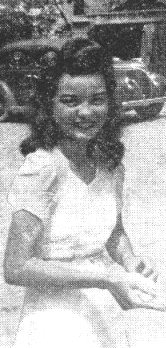
|
Three G.I.'s walked out of the courtroom with puzzled, worried looks on their faces.
Thus in mid-February, ended one of the few tales from Singapore which live up to the average American's over-romantic conception of this city as "the most wicked town in the world." - center of webs of cosmopolitan intrigue, and mysterious, glamorous women.
For the beginning of the story, we go back to the days soon after the surrender of Japan when the first G.I.'s of the Signal section of the Liaison Detachment landed in Singapore.
The tale starts in the bar of the world-famous Raffles Hotel. There G.I.'s spotted a beautiful, black-haired Eurasian girl in a slinky evening gown. The girl spoke perfect English, with American overtones.
BORN IN CHINA
She had been born in China of mixed Chinese-Portuguese parentage. As a teen-age girl she had come to Singapore to serve in the villa of a fabulously wealthy Chinese merchant as one of his private troupe of "entertainers."
When the Japs arrived, she was interned. But soon the Nips reopened the villa as a club for German Axis partners in Singapore. Doreen was released to serve as a hostess at the German Club. There she met and married the band-leader, handsome Manuel DeSilva. However, they were divorced, the beauteous Eurasian told G.I.'s.
After the liberation of Singapore, Doreen took a job as head hostess at Singapore's Liberty Cabaret. Her enormous wardrobe, she explained to the G.I.'s, was possible because she had a rich uncle in town who provided her with an independent income. She was a swell sport. One G.I. who went out with her for two months, spent only $7.00 Straits money on her entertainment. She constantly offered to lend the boys money along toward payday. The dance hall queen spoke seven languages - Japanese, Javanese, Malayan, English, Hindustani, German and Chinese.
One day early in January, Doreen's G.I. escort brought her home in the early morning. As they parted, they agreed to another date the next afternoon at 5 o'clock. The American knocked on her door promptly at the appointed hour. Relatives answered the door, weeping. "Doreen has been arrested."
In early February Doreen and her actual husband, band-leader Manuel DeSilva, were brought to trial, where the story unfolded.
The chief witness was Nozawa Toichi, former Jap "Kempai Tai" agent. he told how the Kempai Tai suspected that leaks of secret information to the Allies were coming from Tipsy Germans at the German Club.
BECAME SPIES
Toichi, acting for the Kempai Tai, approached the DeSilvas, offering them $50 per month, extra rice, sugar and cigarette rations if they would submit regular reports on the manager of the German Club and the hostesses. The DeSilvas went to work for the Kempai Tai.
They submitted reports from June, 1944, to January, 1945. On the strength of the information they sold to the Nips, Manager Fernando and six hostesses were arrested by the Japs and brought to Kenpai Tai headquarters for "interrogation" as suspected Allied spies.
Manager Fernando was tortured so unmercifully he tried to commit suicide by jumping out of a window 60 feet above the ground.
A brand new gallows is being erected at Singapore's modern Changi Jail. Unless higher British military authorities accept the Court's recommendation for mercy when they review the case, the "Sweetheart of the Signal Corps" and her band-leader husband may well be among the hangman's first customers.
DEPOT LEAVES ‘KAN’ FOR SITES NEAR CITY
Roundup Staff Article
CALCUTTA - The transfer of Replacement Depot No. 3 from Kanchrapara to within the city of Calcutta was being effected this week.
Personnel shifts were being staggered in keeping with departure time of the transport General Hodges, tentatively scheduled to leave on Mar. 5. All casuals due for passage on the Hodges, approximately 3,100 of them, were moved into town in a three-day operation starting last Sunday.
The 1,200 casuals who must await another ship will be transferred into town on the day that the General Hodges actually departs.
Headquarters of the replacement depot will be at the site of the 142nd General Hospital, where a portion of the buildings have been allotted for that purpose. Casuals will be quartered at Camp Dum-Dum (Orphanage), Tollygunge and Camp Dhakuria, the transient camp situated directly across from the 142nd Hospital. A small casual holding area will be maintained at Kanchrapara until after the Marine Jumper sails.
Col. William A. Burbank will remain in command of the depot. He and Brig. Gen. Walter K. Wilson, Commanding General of Base Section, have been in consultation regarding aspects of the changeover, and Wilson was scheduled to go to New Delhi this week to complete overall plans for staging troops in the future.
"This may be quite a problem," said Wilson, "since our facilities permit staging only 3,800 troops in the Calcutta camps at the very maximum. The tentative shipping schedule, over which the Theater has no jurisdiction, has the Marine Jumper due on Mar. 20 and the Marine Cardinal due on Mar. 22.
"It will require that many men stationed in the Calcutta area remain with their home units until the last few days before boarding the ship. This will demand the ultimate in co-operation from each individual to ensure that he does not delay his own departure and that of his fellow soldiers.
"Quite definitely, no ship will leave here with vacant troop accommodations."
From the standpoint of permanent personnel, the transfer into Calcutta will afford a large reduction in depot staff, according to Burbank. Approximately 1,400 men formerly were assigned to staging and shipping troops, and were stationed both at Kanchrapara and in Calcutta.
"When the Calcutta move is completed, there will be less than 450 men as permanent personnel," stated Burbank, "which means an approximate 70 percent reduction. However, initially a sizeable group will remain at Kanchrapara to run the small camp and complete deactivation of the area before it is turned over to the British. That group will number about 250."
670 Request Surplus Goods
Roundup Staff Article
Request for U.S. Army surplus property have been received from 670 G.I.'s and officers throughout the I-B Theater, Maj. William F. Keefe of the Theater Exchange Office told Roundup this week.
The plan, which closes Friday of this week, is being carried out by the Army Exchange Service, G-4 and the Foreign Liquidation Commissioner, and gives Army personnel a chance to buy articles of surplus property.
All requests are being compiled by the Theater Exchange Office and will be turned over to FLC Friday. G-4 will attempt to locate and supply FLC with all articles requested. FLC will then sell such articles as are available to the Theater Exchange officer who will then fill all requests possible.
Articles that are available will be delivered to the Exchange designated by the individual as soon as possible. When articles are not available, each individual will be notified by letter by the Theater Exchange officer.
Staffer Makes ‘Dry Run’ On U.S.-Bound Transport
By SGT. RAY SCHWARTZ Roundup Staff Writer
CALCUTTA - The troop transport General Collins tiptoed through the narrow, misleading channels of the Hooghly River last Friday morning and gently made its way toward open sea.
Aboard her were some 3,000 casuals, homeward bound.
But for four of the passengers, including this eager beaver, it was strictly a dress rehearsal. As the dateline will attest, we're all back in town again.
It was nice while it lasted.
The excursion was arranged by Lt. Nathaniel Morrisette of Base Section Embarkation and Debarkation. It was intended for the local radio wallahs who planned a new takeoff in programs aboard ship. Previous shows from the Karachi and Calcutta ports were confined to the time when ships were docked. This was to be an extemporaneous "man of the deck" offering as the General Collins sailed down the Hooghly River.
Numbered in the party were Capt. Charles Boyle, I and E officer at Base Section, S/Sgt. Howard Williams, announcer, and T/Sgt. Jim Koehler, chief engineer for radio station VU2ZU. I tagged along to kibitz.
Tentative sailing time was 6 a.m. but the Navy seems to operate on a time of its own. We hustled ourselves out of bed at 4 a.m. and the sudden thought that it was only 3 a.m. in Delhi made my rising that much tougher. It was dismally dark as we reached No. One Princep Ghat, at 5:30 o'clock. The blue coating of the ship was lost in the gloom.
We climbed aboard to be greeted by two naval officers, perhaps their equivalent to our Officer of the Day. They spoke softly and cautiously, as though not to intrude on the surrounding silence. What they said was sweet music. Stateside coffee awaited in the mess hall behind them. Everywhere was complete quiet, except for the occasional clatter of a saucer by the mess attendant.
I made through two cups of coffee and began a tour of the ship. Three G.I.'s were mumbling to one another as they stood along the ship's railing. "Too hot to sleep, isn't it?" offered one. Came a nod and I asked how they felt about severing their last ties with India's terra firma. They presumed I was sharing in their good fortune.
"Heck, I dunno," was one reply. Only his vivid-colored Stilwell Road patch was wholly apparent in the darkness. "I have no reaction yet. I waited a long time to get my orders and I waited a long time to get the hell out of Kanchrapara. Well, here I am - and no excitement. It's just like coming across, only much better."
I laid below (that damned Navy vernacular) to the troop sleeping quarters. The sight of them
|
I adjourned to the latrine and trespassed on a conversation. One guy adorned only in white sorts, talked away between razor swipes at his week-old beard. Sometimes he managed to accent his attitude with a dangerous wave of his cream-smeared brush.
back I went through the jammed sleeping quarters. Some men were beginning to stir, but most of them were draped in various patterns across their bunks. One fellow was reading. he noticed that I was dressed and idled out of bed to put on his clothes. It wasn't even 6:30. "Gawd," he muttered. "I don't eat until 8:30."
I wandered aimlessly around the ship until I located Boyle. The others had eaten and I was guided to the troop mess. I want to repeat: the troop mess. Many acquaintances had written back that the food aboard ship was good. We had stateside coffee, stateside butter, stateside eggs and stateside cleanliness. Believe me, the food is good.
The remaining time was spent in patiently waiting. We finally moved out a few minutes after 8 o'clock. There was no sentimentality. The farewell committee at the dock consisted of a girl balanced on her bike, an older man in European clothes, and the usual amount of beggars for the last-minute handout.
We needed someone's blessings. The ship had an iron stairway for transfers at sea. "But they only drop it for God and the admirals," informed one of the sailors. Therefore, we had to make our way down a rope ladder to the Navy launch standing alongside I must have done rope ladder climbs at least 5 times. Here was the reason for it... six months after the war.
"Lucky dogs," a G.I. yelled down to us. "What do you have to do in the Army to rate a launch?"
Lucky dogs, hell. He was the one who was going home.
STILWELL TO HEAD 6TH ARMY
By UNITED PRESS
Gen. Joseph W. "Vinegar Joe" Stilwell, former China-Burma-India Theater commander, has been named to command the re-activated U.S. 6th Army, the War Department announced this week.
Headquarters of the 6th will be at the Presidio in San Francisco. Stilwell's home is in Carmel, Calif., approximately 200 miles south of the Golden Gate city.
The 6th Army played an active part in the Pacific war from New Guinea in 1943 to the occupation of Japan under the command of Lt. Gen. Walter Krueger. It will be re-activated Mar. 1.
The WD described the new step as part of its move to streamline the ground forces. Along with reactivation of the 6th Army, the 7th Corps headquarters at the Presidio of Monterrey, and the Western Defense Command in San Francisco will be in-activated and their staffs merged to form the new 6th Army headquarters.
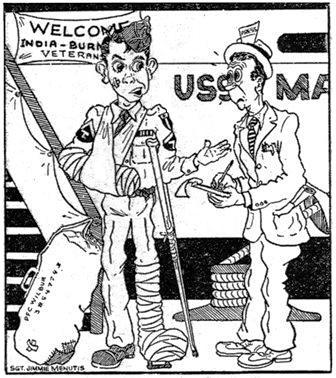
|
Roundup Staff Article
An uneasy quiet settled on Bombay and Karachi over the weekend after a week of rioting and a Royal Indian Navy mutiny. It was officially announced that 223 persons were killed and 1,037 wounded - a total of 1,260 casualties in Bombay. At Karachi, four RIN ratings were killed and 26 wounded. Calcutta has been relatively untroubled.
Trouble started in Bombay a week ago Monday when RIN junior ratings went on strike and started demonstrations in the city, and last Thursday Royal Indian Air Force personnel went on strike in sympathy. Mutinous seamen ordered British officers from their ships in the harbor, trained their guns on the town and with the help of Indian civilians battled British soldiers, marines and Indian police in the streets of the city, according to United Press.
BURN BUILDINGS
Civilians were actively rioting all week. Looting, burning, crowds attacked a bank, a post office and a municipal building, despite the plea of leaders of the All-India Congress party for peace and an appeal by Mohandas K. Ghandi for an end to the "thoughtless orgy of violence."
Indian seamen billeted at HMIS Talwar, the Communications Training Establishment, and at Castle Barracks barricaded themselves inside and exchanged shots with military guards outside. Riots came to an end Saturday and the mutineers aboard ships in the harbor surrendered.
SURRENDER
In Karachi, RIN ratings took over control of HMIS Hindustan and opened fire Thursday with all weapons, from four-inch guns to small arms, then put out into the harbor and defied higher authorities. On Friday the ship was brought under fire from the shore and surrendered after 25 minutes of action.
Anti-British riots in Egypt, going strong for the past ten days, reached an explosive pitch in Cairo and four other cities.
|
$13,000,000 OF SURPLUS PURCHASED BY UNRRA
Roundup Staff Article
The purchase of more than $13,000,000 worth of U.S. Army surplus property in India has been completed for the United Nations Relief and Rehabilitation Administration under the United States' contribution, mostly for use in China, it was learned by Roundup this week.
Aircraft, food, medical supplies, engineering equipment, trucks, railroad equipment, synthetic rubber, Quonset hits, newsprint, railroad equipment and cloth comprised the main items purchased. Edmond E. Williams of Oklahoma City, the UNRRA representative from Washington in charge, said that the purchases actually cost UNRRA $9,000,000. Part of the materials are for Yugoslavia, Czechoslovakia and Albania.
Moneys expended come out of America's 1945 contribution, which totals $800,000,000. India, like the U.S., is a contributing member of the Administration, giving $24,042,000 for 1945 and receiving no benefit. Henry R. Atkins of Brookline, Mass., is the UNRRA Liaison officer with the Indian Government. Discharged last year as a T/5 after 3½ years with both the Canadian Army and U.S. Army-Aircraft in Africa, Sicily and France, Atkins arrived here in December.
UNRRA purchased the following from U.S. Army surplus property in India: Three C-47 airplanes and equipment (for Yugoslavia), $113,000; meat component items, $5,350,000; 7,025,000 cans of evaporated milk, 1,350,000 pounds of stabilized butter and 95,000 "10-in-1" rations, $1,643,500; medical supplies $1,643,500; 3,361,000 pounds of raw synthetic rubber (for Czechoslovakia) $1,221,100.
Engineering supplies and small tools, $60,000; engineering equipment - road graders, well-drilling machines, hypochlorinators, tractors and concrete mixers, $2,000,000; rails and railroad equipment, $215,000; 23 Quonset huts, $7,500; 500 rolls of newsprint (for Albania) $9,000; 1,250 2½-ton cargo trucks with spare parts, $2,500,000; cloth, $250,000; total value, $13,369,100.
Williams, and ex-Army Q.M. Corps major with 2½ years' service in the Aleutians, expects to have all the purchases en route to their destination in April and he will then return to Washington. An associate, Miss Christine Coiro, of Far Rockaway, N.Y., leaves for home March 1. So far, 12,000 tons of material have been shipped out aboard three ships.
Liberty Ship Retains Ammo Dumping Record
Roundup Staff Article
CALCUTTA - When the S.S. Florence Martus returned to Calcutta for the fifth time on Feb. 20, not only had she jettisoned the last load of ammunition from this port, but she also retained a unique record for the disposal of cargo at sea.
The record was set on the Liberty ship's fourth shuttle trip to the Bay of Bengal, when 6,800 tons of ammunition were dispatched over the side in a total of only four days. Largely responsible for the speedy discharge of cargo were G.I.'s of the 1944th Ordnance Co. and the 497th Port Bn., who supervised the unloading of three holds, while members of the merchant crew unloaded the two remaining holds.
Since early last November when the ammo disposal began, the Florence Martus has jettisoned over 20,000 tons of poison gas bombs, land mines, hand grenades and shells during the course of five shuttle trips to the dumping grounds in the Bay.
Every possible precaution was taken to guard the safety of those engaged in the risky unloading work. Gas masks were issued on the first shuttle; lifeboat drills were held while at sea; and Army medics accompanied the ship on each of its runs.
Accidents were encountered only on the first trip, when several G.I.'s were burned by leaking mustard gas, and on the third trip, when a cargo net gave way high in the air and dropped a few score fragmentation bombs back into a hold being worked by the ship's crew. Through sheer good fortune, the bombs failed to explode, and workers in other holds went on with their jobs, unaware of the accident.
The officers and crew members of the S.S. Florence Martus, who realize that their unloading record is held jointly with the Army, are anxious to express their cooperation for the assistance of the Army personnel. Through Capt. J. B. Gaier, ship's master, they have requested Roundup to relay their good luck wishes and thanks to all.
Bengal Depot Is New Home Of AAF Hdqs.
CALCUTTA - The headquarters for the U.S. Army Air Forces, IBT, moved from Hastings Air Base, Rishra, to the Bengal Air Depot at Titaghur last week.
Brig. Gen. Thomas B. McDonald will direct future Air Force activities and evacuation of this Theater with a consolidated staff of headquarters and depot officers. Col. Glenn C. Thompson will continue as commanding officer of Bengal Air Depot.
After nearly two years as a focal point for Air Force operations during the China-Burma-India campaigns, the Warren Hastings Jute Mill, the largest jute mill in the world, will revert back to its civil proprietors. Early in 1944 this site became Headquarters for the Allied Eastern India Command, the U.S. Army Air Forces and Air Service Command in China-Burma-India Theater, and Headquarters, India-China Division, Air Transport Command. Under these allied commands the prosecution of combat air operations was planned and expedited at this Headquarters.
During the war days, the population of Hastings Air Base reached a peak of well over 6,000, plus 4,000 civilian workers.
|
MISSING ROUNDUP COPIES WANTED Unable to furnish the Theater Historical section with a complete file of Roundups to be used for historical purposes, the editors this week appealed to old-time readers in the hope that the missing copies may be secured. In 1942, 17 Sept., 24 Sept., 22 Oct., 26 Nov., 10 Dec. In 1943, 22 April, 29 April, 6 May, 20 May, 10 June, 1 July, 22 July, 29 July, 16 Sept., 23 Sept. In 1944, 13 Jan., 10 Feb., 17 Feb., 30 March. In 1945, 18 Jan. and 5 April. Any readers having these copies may send them to Roundup. MORE |
AIRWAY DELIVERY OF LETTERS
Roundup Staff Article
Due to the reduction in air tonnage and to insure air delivery of the most important and urgent mail, the Theater Postal Officer has announced that only the following types of mail may be sent to the U.S. via air:
1. All War Department Essential Official Mail.
2. All official mail weighing less than two pounds and all official mail, regardless of weight, properly certified as being of time value and that air service to the U.S. is essential.
3. All personal free mail and air mail, weighing not more than two ounces.
4. All personal registered mail not exceeding eight ounces in weight. This applies only to small essential articles such as watches, fountain pens, and eyeglasses being returned to the U.S. for repair.
5. Single copies of the Roundup.
All mail not in the above categories, including mail being forwarded or returned to senders in the U.S. will be dispatched via water transportation.
Life In Bangkok Seen As Acme Of GI Duty
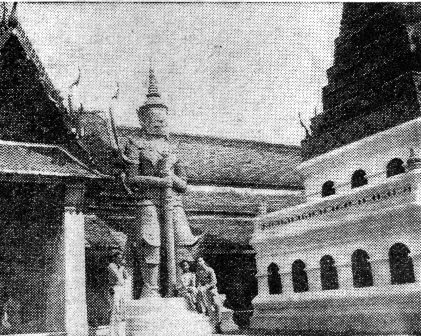 Sgt. Edward G. Krasnecki, a transient on his way from China to New Delhi, snaps a picture of Chancham Bunnag, ATC
receptionist in Bangkok and graduate of Northwestern University, with Pfc. James H. Cordrey. Cordrey is from the
1304th ATC BU. The group is visiting Bangkok's fabulous Temple of the Emerald Buddha.
Sgt. Edward G. Krasnecki, a transient on his way from China to New Delhi, snaps a picture of Chancham Bunnag, ATC
receptionist in Bangkok and graduate of Northwestern University, with Pfc. James H. Cordrey. Cordrey is from the
1304th ATC BU. The group is visiting Bangkok's fabulous Temple of the Emerald Buddha.
|
Haven Of I-B - Siam
By SGT. ED ALEXANDER Roundup Staff Writer
BANGKOK, SIAM - Rumors have been floating around India for some time that there exists in this Theater a G.I. "never-never" land where men sleep in marble-floored palaces; where there are cabarets whose beauteous hostesses far outnumber the males; where civilians own genuine multi-roomed houses; and where contented Yanks hardly ever talk about their points.
Duty is duty. When Roundup wanted to track down the rumor, what could I do but obediently enplane for Bangkok? The trip started under good omens when Gen. Webster, ATC European chief on an inspections tour, let me hitchhike from Calcutta to Siam in his staff ship, which featured a ham steak and apple pie in-flight lunch.
The flight ended on a note of just retribution when Jap POW's, wearing their old Army "uniforms," stepped into the plane at Bangkok airfield, respectfully saluted and subserviently hauled off our baggage.
Now to the facts of life in Bangkok. Yes - the palace business is true. I personally sampled the inner-spring mattresses, and the dinners of soup, fish, game, meat, vegetables, salad, fresh fruit, cake and coffee just so Roundup readers could know the truth and nothing but the truth.
Here's how paradise started. During the war, OSS had contact with the Free Thai underground movement. Shortly after the Jap surrender, OSS Detachment 404 flew into Bangkok with Combat Cargo to take care of Allied prisoners and aid in the collection of war crimes evidence. In September, ATC moved in to establish a base for the Calcutta-Manila-Shanghai route.
THAI HOSPITALITY
The pro-Allied Thai government, established even before the Jap surrender, promptly offered housing and food to the Americans as a gesture of gratefulness and hospitality. "Housing" for ATC transients turned out to be the "Red Palace," formerly the residence of a royal prince, still replete with ornate chandeliers, oil paintings and marble busts.
OSS, now called the Strategic Services Unit, drew a palace compound used by Field Marshall Luang Pibul Songgram, war-time dictator of Siam, who is now held in custody by the Siamese government as their No. 1 war criminal.
The only hitch in palace life is the plumbing situation. B-29's hit the power plants of Bangkok with unerring accuracy and they have not yet been fully repaired. There is no running water, so you pour your water out of a big urn into green tile modern appurtenances.
Breakfast is usually fresh eggs. Lunch is a five course Thai-style meal, with lots of shrimp, crab and stuff. tea is served at 4:30 p.m. Supper is the soup-fish-game-meat deal. Of course, white tablecloths, ancestral silver and courteous waiters are provided.
I was told to get a rounded picture of G.I. nightlife in Bangkok. Duty is duty. So here goes. Bangkok has approximately 130 cabarets, post-war institutions expressly designed for the comfort of foreign soldiers.
I only visited three of them in one night, so I can't present a complete picture (To the editor: shall I stay awhile and finish the job?)
PINT FOR $2.50
A pint of whisky cost about $2.50. The cabarets work on the hostess system. It costs the equivalent of 70 cents to buy five dance tickets. Or you can have your favorite hostess sit with you for the price of a 35 cent peppermint drink.
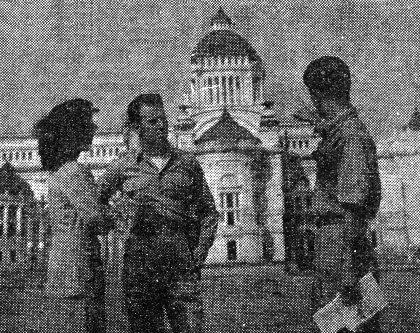 Chancham Bunnag and Pfc. James H. Cordrey, look on as Mr. C. Rangrikul, Chief of the Bulletin Section of Siam's
Publicity Department, points out Bangkok's modern Assembly building. Literally translated, Miss Bunnag's first name
means "moonbeam."
Chancham Bunnag and Pfc. James H. Cordrey, look on as Mr. C. Rangrikul, Chief of the Bulletin Section of Siam's
Publicity Department, points out Bangkok's modern Assembly building. Literally translated, Miss Bunnag's first name
means "moonbeam."
|
Bangkok hostesses get 200 "bahts" per month wages, plus 40 percent of the tickets and drinks, amounting in all to nearly 1,000 baht per month. Some hostesses earn as much money as the Under-Secretary of State, and about four times as much as the highest salaried female government workers.
Thus the profession attracts a very, very teek looking bunch of young women. I am told that some girls, anxious to pile up a good hoard before the soldiery leaves, are not adverse to a little extra-curricular activity after work. But to verify this, Roundup will have to send down one of the staff who hasn't got a wife and child.
Before night-clubbing you can go to the fights, held twice a week in a modern outdoor bowl - ringside seats for 85 cents. The main event is stateside boxing, while the other five bouts are in the traditional centuries-old Thai style. Thai boxing features the drop-kick, knee-in-the-groin and elbow smash to the jaw, in addition to the garden variety punch. Knockouts are quick and frequent.
SPIRITED CROWD
The spirit of the crowd is strictly from Brooklyn. Vendors hawk their wares, including highballs. The crowd raises hell when the action stalls and yells "knockout, knockout" all afternoon. In place of our pre-battle ceremonies with the referee, Thai boxers kneel and touch their foreheads to the canvas and do a little dance.
When the fight is over, our handshake is replaced by an embrace and forehead touching between the contestants. But the spirit of sportsmanship is plainly the same as ours.
Now to the theater. Take your choice - Classical Thai dramas in wondrous costumes; modern Thai plays or burleycue. Billy Minsky would starve in Bangkok, because here burleycue is burleycue. They take it straight - without male comics as a chaser. There's not much that can be said about the brassieres. And-ah-have you ever seen a cellophane G-string?
But what really contributes most to making the 100 G.I.'s here forget about their points is the spirit of the Thai people. "Thai" means free. Siam has been independent through all its history.
Lots of farmers own their own land and live in wooden houses with several rooms. So do folks in the city. Civilian homes here have furniture in them. The streets are full of kids carrying school books and wearing shoes. Bangkok ladies wear skirts and cute blouses. The men wear slacks, polo shirts and straw hats. The main street looks like something out of the New York World's Fair, with a huge, modernistic "Monument to Democracy" in the middle. It's almost
|
Above all - the people are friendly, gracious and proud of their freedom. They have the same fun-loving, gently irreverent, kidding spirit that we do. The modern Thai drama is an illustration.
The play we saw dealt with a mythical king, who, tired of royal life, set out to wander the countryside as a boxer and ended up stingingly, but pleasantly, drunk. In the course of the action, the actors put on at least three rip-roaring fights. One of these bouts, a la Olsen and Johnson, ended up in the laps of the front row customers. Actors even whistled at pretty girls on stage.
One of the biggest hits has been "Free Thai," a play about the underground which kids the pants off the Japs and features lots of gun-fighting and explosions.
When Rudyard Kipling wrote "East is east, west is west and never the twain shall meet," he hadn't visited Bangkok. The twains have met, so far as the G.I. here is concerned, in Siam's spirit of fun and freedom.
World-Traveling USO Troupers Open I-B Tour
Roundup Staff Article
An unusual and well-traveled USO camp show, Musical Varieties, has just arrived in the I-B Theater - unusual because the group is composed of former members of different USO units, and seasoned globe-trotters because the past itinerary of all the entertainers include every theater of operations except the I-B and China which they will cover in the next few months.
Composed of five performers, USO Unit 496-A features Jerry Shelton, accordionist and composer; Virginia Stevens, ballet-tap dancer; Benjamin DeLoache, baritone; Rita Holder, Spanish dancer; and Jean Berger, pianist and composer.
Shelton, hailing from Chicago, first achieved a reputation playing with the old Shep Fields "Rippling Rhythm" orchestra as a featured accordionist. Later he made several concert tours with Veloz and Yolanda, appearing in Carnegie Hall and the Hollywood Bowl.
Miss Stevens is strictly a Buckeye and is always looking for G.I.'s from Ohio, especially Cleveland. She originally trained as a classical ballet dancer, but later became interested in tap, eventually combining the two dance forms. Virginia was one of the first entertainers to hit the Normandy beachhead on "D plus 35" where she put up her own pup tent, cooked her own food and sweated out V-1's and shellfire.
DeLoache, manager of the unit, was the first concert artist to be sent overseas by the USO. His rich baritone voice has become known through records he made with Leopold Stokowski and he has appeared in over 30 solo performances with Stokowski and the Philadelphia symphony orchestra, soloing many times with Sir Thomas Beecham and once at the Jubilee of King George VI in London.
Miss Holder, born in Brooklyn, danced with the Metropolitan Opera Company in New York for five years. Later Jose Iturbi invited her to appear as guest artist with the Rochester Philharmonic which Iturbi then conducted.
Berger (call him "mister") born in Alsace-Lorraine, has toured Europe and the Orient as a concert pianist and later composed songs for Nelson Eddy, James Melton, Andre Kostalanetz, and other artists. Berger was drafted early in the war and served in the Army with the OWI.
After playing at Karachi, New Delhi, and Agra, the unit will appear for 30 days in the Base Section area before going to the Assam area, and then on to the China Theater.
|
U.S. TROOPS ASSIGNED DELHI PARADE PLACE NEW DELHI - Two hundred and two enlisted men and three officers, representing United States Army forces in the India-Burma Theater, will be the leading marching element of nearly 14,000 Allied troops who will parade through New Delhi's main streets on March 7. Details of the parade, one of the many events scheduled as part of Victory Week, March 3-9, were disclosed this week by Capt. Treadwell S. Place, American Delhi Military Area Command adjutant. The USF group will be chosen from different units in the new Delhi area. At the head of the contingent will be Capt. Donald C. McCullough, commanding officer of Co. A, Hq. Bn., Lt. Donald Soper of the 835th Signal Bn., and Lt. I. R. Wendt of ADMAC. Lord Wavell, Viceroy of India, will take the salute from a reviewing stand on Kingsway, governmental mall of New Delhi. Units will assemble in the vicinity of Prince's Park, then proceed along Kingsway, Queensway, Minto Road and Circular Road to the vicinity of Irwin Hospital, a distance of more than four miles. |
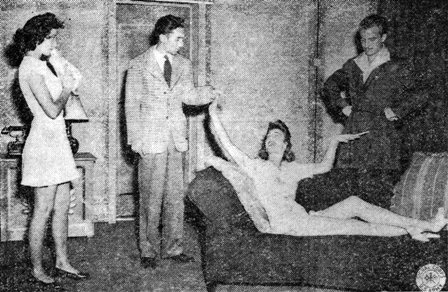 This scene is from Private Lives, a GI production doing a five-day run at Monsoon Square Garden in Calcutta.
The play was produced by the Entertainment Production Unit in cooperation with Base Section Special Services.
Left to right are Virginia Claudon, ARC girl from Fairbury, Ill., Sgt. Gene Matthews, Davenport, Ia., Ann Miller,
ARC girl from New York City, and Sgt. Dennis Allen of Texas. Miss Miller was formerly a well-known radio actress on all national networks. (Photo by Sgt. Mike Claveman, Signal Corps photographer.)
This scene is from Private Lives, a GI production doing a five-day run at Monsoon Square Garden in Calcutta.
The play was produced by the Entertainment Production Unit in cooperation with Base Section Special Services.
Left to right are Virginia Claudon, ARC girl from Fairbury, Ill., Sgt. Gene Matthews, Davenport, Ia., Ann Miller,
ARC girl from New York City, and Sgt. Dennis Allen of Texas. Miss Miller was formerly a well-known radio actress on all national networks. (Photo by Sgt. Mike Claveman, Signal Corps photographer.)
|
I-B’s Ann Miller Played Neurotic Women To Sweet Commercials Over U.S. Radios
Roundup Staff Article
CALCUTTA - Ann Miller, radio actress turned Red Cross girl, has one of the leading roles in Private Lives, an EPU - Special Services production which is operating before packed houses this week at Monsoon Square Garden.
This is actually small potatoes for Ann, who found outstanding success in radio before joining the Red Cross a year ago. She had been featured on all major U.S. networks, including many big-time shows originating from Chicago and New York and was sufficiently popular to rate gossip notices from Walter Winchell and Ed Sullivan.
Her radio career, they used to say, was a study in contrasts. half her time was spent portraying neurotic hysterical and generally unpleasant females - and the other half was devoted to lilting sweet commercials in a manner that sold. Ann is credited with having peddled enough commodities to fill a good-sized drug store.
"I'm not really a split personality, though," she cautioned. "It was just that I was able to adapt my voice to whatever role was required." Ann advertised that she gave many a blood curdling yell over the ether, but was not called on for a demonstration.
The shows she participated in reads like a Dunn and Bradstreet show. She also had assignments on
|
Ann also did time on the Kate Smith program and is a veteran at the tear-jerking serials which lure housewives five mornings each week. She has an eye to the future, too, and has done acting, dramatic directing, and casting with the DuPont Laboratories television station WOR. "It's a fabulous industry," she added, "and will far surpass radio. Television work is much harder, however, as it requires as much rehearsal time as a movie or stage play."
One of her best television projects was Easter Parade, which was done for Lily Dache, the hat fiend.
Ann had a brief married life with Capt. Ben Miller of pan-American who came to India in 1942 to help charter some of the present ATC routes in the theater. He was killed later in 1942 while flying a charter route across the Arctic Circle.
The local production of Private Lives calls for Ann to play the part of "Amanda," wife of Elyot. Cast opposite her is Dennis Allen of the 40th Special Service Co., who had much experience in repertory companies in the states.
Another Red Cross femme in the cast is Virginia Claudon, who did work in dramatics and radio at William and Mary College. She is cast as "Sybil Chase," while Gene Matthews plays the part of "Victor Prynne." He is doubling in brass as stage manager of Private Lives. The role of "Omar," the bearer, is performed by Howard Kanton.
The play is under the direction of Byron R. Kelley and Larry Eggleton has collaborated with him as scenery and costume designer. Final showing is scheduled Friday night. - R.M.S.
COLORADO COWBOY TOPS RODEO CARD AT ALIPORE
Roundup Staff Article
CALCUTTA - Darhell Bell, Colorado puncher, and Theo Oviatt of Elmo, Utah, won all-around cowboy titles at the two-day rodeo staged by Base Section's Special Service section at the U.S. Army riding stables in Alipore over the weekend.
Some 5,000 persons, representing many Allied nations, watched America's Wild West come to life in this Asiatic setting. In addition to the actual competition, the program offered a "grand entry," comedy mule routines by Max Vegoda of Special Service, a specialty by George MacMurray, songs by Mayne Wood, and the music by the Army band.
Bell garnered firsts in saddle bronc riding and wild cow "milking" on Saturday's card and repeated in the former on Sunday. He also won the bare-back riding competition on Sunday. Oviatt won the Sunday bulldogging competition and took seconds to Bell's victories on both days.
Utim Gonzalez of Cuero, Tex., did an eight-second ride to win the steer riding contest on Saturday and repeated it the following day. George Martin, Berryvill, Va., jockey and former Calcutta race rider, won the bareback event of Saturday.
Ed Kowri of Tulsa, Okla., topped calf roping contestants on opening day with a time of 59 seconds. Tex McConnell of Dublin, Tex., veteran Madison Square Garden rodeo contestant, won the cow milking contest on Sunday.
Seth Corley of Buckholtz, Tex., won the Sunday calf roping honors in 20 seconds. Alkin Acklos of North Valley, Tex., picked up second place honors in bronc and steer riding and in milking events.
Music was furnished by elements of the 547th AAF, 474th ASF and 726th ASF bands under the direction of Sgt. Henry Uhlans.
The Roundup is a weekly newspaper of the United States Forces, published by and for the men in Burma and India, from news and pictures supplied by staff members, soldier correspondents, Army News Service and United Press. The Roundup is published Thursday of each week and is printed by The Statesman in New Delhi and Calcutta, India. Editorial matter should be sent directly to M/Sgt. Charles Kellogg, Hq., U.S.F., I.B.T., APO 885, New York, N.Y., and should arrive not later than Saturday in order to be included in that week's issue. Pictures must arrive by Friday and must be negatives or enlargements. Stories should contain full name and organization of sender. Complaints about circulation should be sent direct to Roundup Distribution Officer, Base Section, APO 465, New York, N.Y. Units on the mailing list should make notification of any major change in personnel strength or any change of APO.

|
FEBRUARY 28, 1946
Original issue of India-Burma Theater Roundup shared by CBI Veteran Douglas MacLeod
Copyright © 2009 Carl Warren Weidenburner
TOP OF PAGE PRINT THIS PAGE ABOUT THIS PAGE SEND COMMENTS
PREVIOUS ISSUE CLOSE THIS WINDOW NEXT ISSUE

